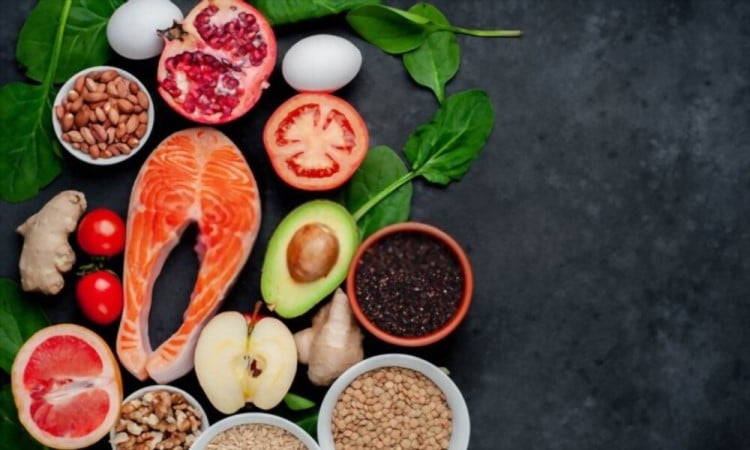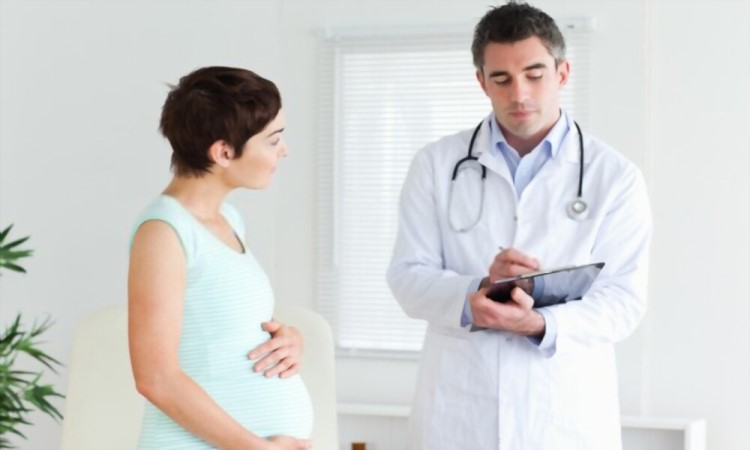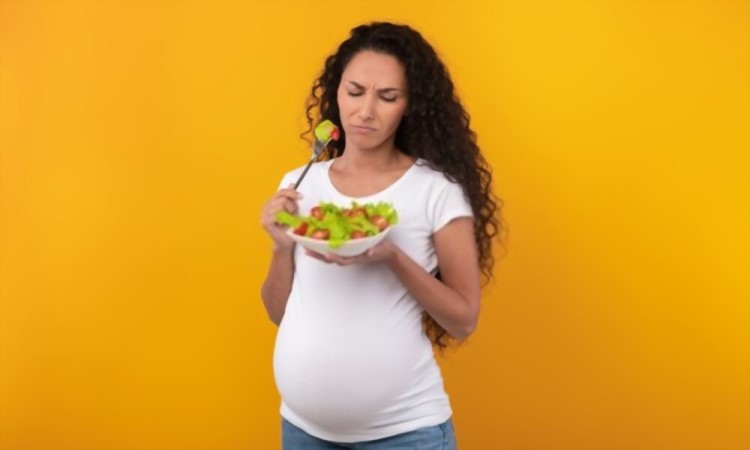When you’re pregnant, you’re responsible for the well-being of a growing human being inside of you. It goes without saying that during this phase, calorie intake and nutritional requirements will increase as well. Pregnant women commonly experience increased appetite and untimely cravings. For some pregnant women, the first trimester can bring intense nausea and a loss of appetite, both of which can sap their energy. Let’s evaluate what causes loss of appetite during the pregnancy 1st trimester.
Reasons For Loss Of Appetite During Pregnancy 1st Trimester
According to our panel gynaecologist Dr Ankita Patel Tayal, pregnancy is the only time in a woman’s life when weight gain is encouraged and eating every two hours is recommended. Despite this, many moms begin to lose weight in the first week of pregnancy due to a lack of appetite. Small unintended weight loss during the first trimester will not harm your baby. No matter how you slice it, not eating while expecting a child is a cause for concern. If you’re supposed to be eating more for your growing baby, why are you doing the opposite?
Here are some important reasons for loss of appetite during pregnancy, 1st trimester:
· Increased sensitivity to smell
Many pregnant women experience a heightening of their sense of smell and taste as a result of the hormonal shifts that take place during pregnancy1. Pregnant women’s appetites are thwarted by unpleasant odors, which makes it difficult for them to eat. Due to their enhanced sense of smell, pregnant women may find that foods they previously enjoyed are now unpalatable. The odor can also induce nausea, which is another reason why they do not consume enough food.
· Food aversions
It’s common for pregnant women to have difficulty eating in the first three months of pregnancy. It is believed that a combination of factors is likely responsible for a shift in the eating habits and preferences of expectant women. It’s possible that your food aversions could make your diet less healthy, which in turn could have an impact on your unborn child. Aversion to meat and eggs, for instance, can lead to a decrease in protein intake.
A low maternal protein intake can result in embryonic losses, intra-uterine growth restriction, and diminished postnatal growth. This is a result of a deficiency in particular amino acids that are necessary for the metabolism of cells2.
Pregnancy-related food aversions can range from mild to severe, and they can occur at any point in the nine months of pregnancy.
Some common food aversions during pregnancy are:
Calculate Due Date With LMP
- Garlic
- Fatty foods
- Onion
- Eggs
- Spicy foods
- Meat
- Coffee and tea
- Milk
Related Reading: 8 Ways To Cope With Extreme Food Aversion During Pregnancy
· Morning sickness

If you suffer from morning sickness, this could be another significant factor contributing to the fact that you are not eating food while pregnant. Around 80% of pregnant women experience morning sickness to some extent3. There are numerous reasons why morning sickness may occur. We recommend a few foods to combat morning sickness during pregnancy.
Hormones say some researchers, are a significant factor. During the first trimester of pregnancy, the body witnesses a rise, peak, and fall in levels of the pregnancy hormone known as human chorionic gonadotropin, or HCG. As HCG levels rise it can trigger nausea and morning sickness4.
A woman’s appetite may be severely affected if she experiences nausea and vomiting due to pregnancy (NVP). Eating can lose its allure if you’re constantly sick afterward. If you’re afraid of vomiting, you might only eat when necessary. This can lead to loss of appetite. Eating only when necessary may be a precaution for those who are afraid of being sick from vomiting.
· Increase in progesterone
Progesterone levels rise gradually in the first trimester of pregnancy. Food and waste move slower through the intestinal tract as progesterone relaxes the muscles. It slows the emptying of the stomach, which leads to constipation. One of the negative effects of having constipation is a reduction in appetite.
· Reduced intake of food results in altered perceptions of fullness
During the first trimester of pregnancy, it is common for women to experience nausea and an aversion to certain foods. However, if you cut back on your food intake on a consistent basis, it may alter your appetite in the long run.
If the pregnant woman continues to consume fewer calories, her body will eventually adjust to the change. She’ll start to get the feeling of being “full” on less and less food as time goes on. People often blame their “stomach shrinking” for their sudden change in appetite.
In reality, the stomach does not shrink. Instead, it becomes increasingly sensitive to the amount of food. If this occurs, you will likely experience a diminished appetite because your body adapts to feeling full on less food. However, even if you think you’re full, you may not be getting enough nutrients for your baby.
Related Reading: 21 Pregnancy Superfoods To Include In Your Pregnancy Diet
Tips To Cope With Loss Of Appetite During The First Trimester Of Pregnancy
Even though you need to consume more nutrients for the baby, your body may go through some changes while it adjusts to the new situation. The good news is that experiencing a decrease in appetite while pregnant is temporary and not a matter to worry about. Pregnancy necessitates that you eat a healthy diet, as your baby requires specific nutrients to grow.
Determining the underlying cause is vital to resolving the loss of appetite during pregnancy. Understanding why you’ve lost your appetite will help you come up with possible solutions. The following are a few suggestions for coping with the loss of appetite during the first trimester of pregnancy:
1. Find out what you are averse to
If you’re not eating because of food aversions, be specific about what you don’t want to eat. For instance, your pre-pregnancy favorite spicy dish can kill your appetite during pregnancy. Take into account other kinds of aversions as well. It is possible that a specific odor or food temperature is causing you discomfort.
Once the trigger has been identified, avoid it. When pregnant, many women prefer cold foods and beverages, while others prefer warm ones. If the temperature of food is the triggering factor, you should always try eating food at the temperature that is most comfortable for you. No matter how healthy an item may appear to be, you should avoid consuming it if you know it has the potential to make you feel ill. There is always a risk-free option available.
2. Take measures to alleviate nausea
One of the primary causes of appetite loss during the first trimester of pregnancy is feeling nauseated. Taking steps to minimize nausea and morning sickness helps to deal with the loss of appetite to some extent.
One strategy that might be effective is to eat several smaller meals throughout the day rather than three main meals. This reduces the symptoms of vomiting and allows the body to absorb nutrients by retaining food in the stomach. Additionally, this strategy prevents loss of appetite to some extent. For many expecting women, taking B6 supplements and prenatal vitamins at a time other than the first thing in the morning is also beneficial to prevent nausea.
3. Make wise food choices

Although you may experience a loss of appetite, your appetite will occasionally return for a short period of time. Utilize this time to your advantage and consume as much protein and complex carbohydrates as you possibly can. This will help maintain a steady level of blood sugar in your body while also making you feel fuller for a longer period of time. This helps to combat fatigue during pregnancy associated with loss of appetite. Bananas, when paired with a spoonful of yogurt, can provide an extra boost of calcium and protein. Crackers made from whole grains or plain are almost always a good idea.
Consider consuming bland, high-fiber vegetables such as sweet potatoes, green beans, and baby carrots. To ensure adequate nutrient intake, quinoa, brown rice, pasta, and macaroni and cheese are recommended for women experiencing appetite loss.
4. Prioritize food and nutrition consumption
During the first trimester of pregnancy, it is essential to consume nutritious food to meet the increased nutritional requirements. During this time, the fetus grows and develops many important features, necessitating the consumption of numerous essential nutrients. A nutritional deficiency at this stage may have lasting consequences for the fetus.
Even if they don’t feel like eating full meals, pregnant women should make an effort to eat a few key foods during this stage of pregnancy. Even if they are experiencing a lack of appetite, pregnant women should keep the following tips in mind when planning their food and nutrition intake.
- Take essential vitamins if you are experiencing appetite loss. This helps to fill in short-term dietary gaps
- In the early stages of pregnancy, dehydration can cause a wide range of problems, including miscarriage, so pregnant women must ensure they drink plenty of water
- Protein consumption is essential during the first trimester of pregnancy. A few good protein-dense snacks include hard-boiled eggs, roasted chickpeas, Greek yogurt, and sliced boiled chicken
- Those who are experiencing a lack of appetite should avoid foods with strong odors. Rather than ordering fast food chicken, try making your own chicken salad instead
- Ginger aids digestion and promotes appetite restoration. Try ginger lime or ginger tea
- Having soups such as chicken soup, vegetable soup, rice soup, etc., are another nutritious way to restore appetite
Related Reading: 7 Ways To Manage Loss Of Appetite During Early Pregnancy
When Is A Loss Of Appetite During The First Trimester A Cause For Concern?
Dr Ankita Patel Tayal, practising obstetrician & gynaecologist for last 10 years, says that as long as you consume enough nutrients daily, occasional appetite loss or a loss of appetite for specific foods is usually nothing to worry about. An occasional loss of appetite is not a cause for alarm if you are eating nutritious meals on a regular basis and your weight gain is adequate to support fetal growth.
It’s not uncommon for pregnant women to have less of a craving for certain foods, like those that have a strong aroma or red meat. That’s also nothing to be alarmed about.
However, you should seek the advice of your healthcare provider if you find that you are regularly skipping meals or that you have lost your appetite and have not been able to eat for more than a day.
Potential Complications Related To Poor Intake During Pregnancy
Chronic lack of appetite during pregnancy can result in malnutrition, which can have adverse health consequences for both you and your baby. Macronutrients and micronutrients are essential for a healthy pregnancy.
- Maternal weight loss and poor fetal growth can both be caused by malnutrition during pregnancy5
- Undernourished pregnant women are more likely to have children with behavioral and mental issues
- Anemia can happen to pregnant women who have trouble eating all the time. The risk of fetal growth abnormalities, low birth weight, preterm birth, and developmental delays in their babies is also high6
Conclusion

As nausea and vomiting wear off, you’ll probably start to feel hungry again. If it doesn’t or if you’re unable to eat, consult with your doctor to deal with the causes and increase your appetite. It is impossible to understate the significance of proper nutrition to the outcome of a pregnancy.


